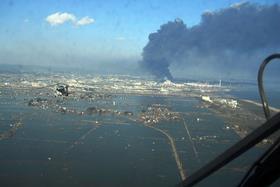
While logistics and distribution for Japan’s fresh produce trade may not be facing major lasting disruption in the face of Friday’s 9.0-magnitude earthquake and tsunami, a bigger question appears to hang over the impact on consumer behaviour for the coming months.
While some northeast coastal ports have been crippled by the quake, these play little if any role in shipping fresh produce, and Tokyo and other major ports of entry for imported produce further south have emerged unscathed.
“The major ports in Tokyo, Kobe and other cities have not been damaged, so we don’t anticipate much impact as far as port facilities are concerned,” said Hisao Takeda of consulting company Yamano & Associates, which represents a number of fresh produce organisations in Japan.
Nevertheless, Mark Golden of Umina Brothers, a major supplier of US citrus to Japan, reported some disruption to shipments in the immediate aftermath of the quake.
“A lot of vessels that were headed for Tokyo got diverted to Kobe and Osaka; other lines like Hanjin headed to Hong Kong instead and will be barging containers `of produce` to Tokyo,” he told Fruitnet.com.
Rationing of electricity and fuel supplies within Japan could also affect internal distribution and retailing of fresh produce, at least in the short-term.
“Fuel has been rationed, so how this affects deliveries remains to be seen,” said Kelvin Bezuidenhout, Asia regional marketing manager for global kiwifruit marketer Zespri. “Our `New Zealand kiwifruit` deliveries won’t start for around four weeks but we expect Japan to make in-roads in resolving any supply chain issues.”
Supermarket stores in Tokyo and seven other prefectures have also been forced to cut back their opening hours in response to emergency restrictions on electricity supplies, according to Mr Takeda, although he added that the impact on sales was impossible to determine on at this stage. “People are queuing up outside stores to buy their food and other products,” he noted.
The immediate priority for the local produce trade has focused on supporting the aid effort in those areas ravaged by the tsunami.
“People need food, water and other items and the produce industry is working to supply bananas to those affected because it’s a convenient food for them to consume,” he told Fruitnet.com. “The banana industry, represented by the Japan Banana Importers Association, is organising this supply but the problem is how to get the products to these people.”
The official death toll has already topped 2,400, but the true scale of the tragedy is still unclear, as thousands remain unaccounted for while many remote towns and villages have not been reached. Japanese officials have predicted the death toll could exceed 10,000.
The northeast coastal region that bore the brunt of the disaster is fairly small in population terms, with the major hub of Sendai home to just over 1m people. And the impact on fresh produce consumption and marketing in the national context are likely to be negligible. There are far-reaching implications, however, in terms of the effects on broader consumer sentiment.
“The biggest question is what will be the repercussions down the road `for trade` as there will likely be a lot of lost sales,” said Mr Golden. “Things like citrus are more of a luxury than a necessity. But those problems are miniscule compared to what the people `near the epicentre` are going through right now.”
Zespri is on the verge of launching its new-season marketing campaign for New Zealand kiwifruit in Japan, and Mr Bezuidenhout also acknowledged a potential impact on consumer behaviour. “The mood in Japan is very sombre and how that will affect consumer behaviour is yet to be seen,” he said. “`History shows that` the Japanese tend to go into saving mode in the wake of major events like this and there could be an impact on demand for premium products.”
Overall, Zespri does not anticipate a major impact on its business in Japan, but Mr Bezuidenhout said it would review its promotional activities. “We’ll have to be very sensitive with our promotions to keep in line with consumer sentiment,” he said. “Usually we take our customers down to New Zealand to visit the production areas ahead of the season but we have cancelled some of those visits.”
The earthquake and tsunami look set to deal a significant blow to Japan’s economy, the world’s third-largest. Some of the nation’s leading producers, including the world’s biggest carmaker Toyota, have closed all their plants in the country. While analysts predict that loss of production to dent the economy during the next two months, they have suggested that growth would return in the third quarter.
Meanwhile, Japan’s fresh produce exports, which are very small compared with its imports, could also face some impact amid perceived food safety risks following radioactive leaks from the explosion of nuclear reactors at the Fukishima Daiichi nuclear plant.
According to reports in the Jakarta Globe, South Korea, Hong Kong, Singapore and the Philippines will test Japanese food imports for radiation.
“As far as radiation is concerned, I think the `riskiest` articles are fresh products – perhaps dairy products and fresh fruit and vegetables,” York Chow, Hong Kong’s food and health secretary told the newspaper. “We are monitoring the situation and also checking at importation venues to ascertain that they have not been affected.”
Singapore’s Agri-Food and Veterinary Authority said it would test imports from Japan, particularly fresh produce, the Jakarta Globe reported.



